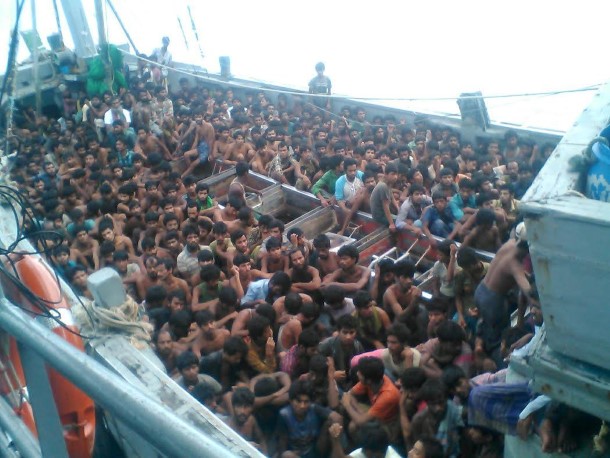A Regional Solution to the Refugee Crisis Must Address Root Causes
By Burma Partnership • June 1, 2015 On 29 May 2015, Thailand hosted the long-awaited Special Meeting on Irregular Migration to address the unfolding refugee crisis in the Andaman Sea. The talks brought together representatives from 19 nations mainly in the ASEAN region, along with delegates from the UN High Commission for Refugees (UNHCR), UN Office on Drugs and Crime (UNODC), and the International Organization for Migration (IOM). At the time of the meeting, the Arakan Project has reported that at least 6,000 refugees, mainly Rohingya, are unaccounted for and likely stranded at sea. Victims of discrimination and denied even basic human rights back in Burma, these individuals are risking malnourishment, dehydration, and abuse in order to escape repressed lives under the Burma Government.
On 29 May 2015, Thailand hosted the long-awaited Special Meeting on Irregular Migration to address the unfolding refugee crisis in the Andaman Sea. The talks brought together representatives from 19 nations mainly in the ASEAN region, along with delegates from the UN High Commission for Refugees (UNHCR), UN Office on Drugs and Crime (UNODC), and the International Organization for Migration (IOM). At the time of the meeting, the Arakan Project has reported that at least 6,000 refugees, mainly Rohingya, are unaccounted for and likely stranded at sea. Victims of discrimination and denied even basic human rights back in Burma, these individuals are risking malnourishment, dehydration, and abuse in order to escape repressed lives under the Burma Government.
As more and more refugees are rescued from the squalid conditions at sea, survivor accounts have begun to emerge. Human Rights Watch recently published accounts that detail the dangerous journey from Burma, including stories involving traffickers intentionally abusing the refugees in order to hasten ransom demands, being forced at gunpoint into departing refugee boats, and the cramped and overcrowded conditions of the boats used to transport the refugees. A 16-year-old Rohingya girl described her experience on board the refugee boat, “When I got to the big boat … I cannot explain my feeling I was so scared. We were about 16 people in one small room. The doors were always locked. The smugglers put the food and water through a small hole, we never saw them.”
The Burma Government, whose discriminatory policies and practices have fueled current Rohingya refugee crisis, has dictated the terms of the Special Meeting since before it began. An earlier threat to boycott the meeting has resulted in most attending nations to submit to Burma’s demand that the Rohingya be referred to only as “Bengali,” a term that enforces the false claim that the religious minority are nothing more than newly arrived immigrants. During the opening remarks of the meeting, UNHCR representative Volker Turk called on Burma to accept responsibility for the refugee crisis and work towards granting citizenship for the persecuted Rohingya. In response, Burma’s Foreign Ministry Director-General Htin Lynn accused the UNHCR of politicizing the event, “singling out” Burma, and most disturbingly, added that some issues are merely “internal.”
Following the Special Meeting, Thailand’s Ministry of Foreign Affairs issued a summary of the proposals and recommendations made during the conference. The summary called on members of the ASEAN and international community to strengthen the effort to rescue stranded refugees as an immediate priority. In addition, the report demanded that ASEAN nations cooperate in the investigation of human trafficking throughout the region along with addressing the root causes behind trafficking within at-risk communities. The UNHCR, UNODC, and IOM have tabled a 10-point plan similarly expressing concern for the immediate rescue of refugees, the facilitation of international protection for certain individuals, and enhancing capacity-building for transit and destination countries.
Unfortunately, it appears that the Special Meeting has failed to deliver any tangible results. Burma’s refusal to admit responsibility in the ongoing refugee crisis will prevent any effort to address the root causes. Charles Santiago, Chairperson of ASEAN Parliamentarians for Human Rights and Malaysian MP expressed doubt at the conclusion of the meeting stating, “The meeting’s failure to openly discuss the desperate conditions and systematic human rights violations suffered by the Rohingya population is tantamount to complicity in the crimes being committed against them. A country responsible for human rights violations cannot just veto any discussion of them in an open meeting.”
A concerted regional effort is required to assist stranded Rohingya in the Andaman Sea. While the Special Meeting in Bangkok nurtures hope that talks regarding the plight of refugees will continue, ASEAN nations and the international community must convince the Burma Government to take accountability for the systematic discrimination of Rohingya that has caused the current regional catastrophe. This is especially true if ASEAN hopes to achieve a people-centered, caring regional community. Burma Government’s inhumane treatment towards the most vulnerable members of society indicate that it deserves a concrete response from both ASEAN and the international community.
Tags: ASEAN, Burma Partnership, Displacement, Human Rights, International Organization for Migration, Ministry of Foreign Affairs of the Kingdom of Thailand, Refugee, Rohingya, Trafficking, UN High Commissioner for Human RightsThis post is in: Blog
Related PostsBurma Partnership Celebrates Continuing Regional Solidarity for Burma and Embraces the Work Ahead for Progressive Voice
Myanmar’s New Dawn :Opportunities for Aung San Suu Kyi and U.S.-Myanmar Relations
Expanding People’ Solidarity for a Just and Inclusive ASEAN Community
Civil society launches #FreeThe5KH campaign in support of the imprisoned ADHOC staff and NEC official
Myanmar logging ban a major step to forest sector reform









 All posts
All posts